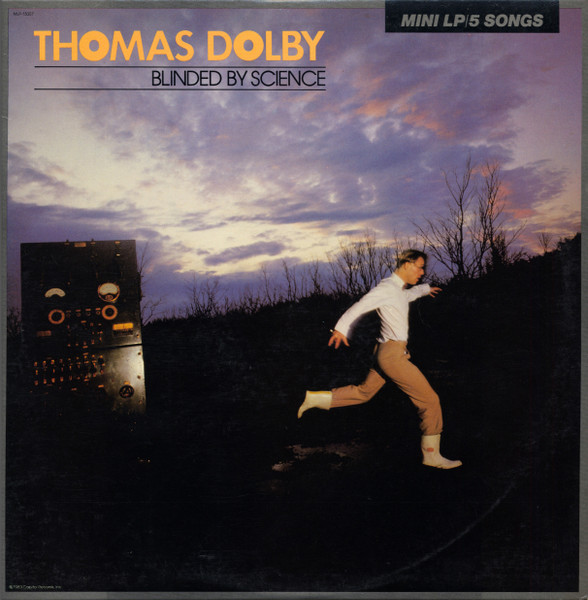 Many one-hit wonders don’t deserve the appellation, since the assumption is that they never did anything else of merit. Thomas Dolby proved that to anyone who took the time to listen to his catalog, even if he can’t escape his one hit.
Many one-hit wonders don’t deserve the appellation, since the assumption is that they never did anything else of merit. Thomas Dolby proved that to anyone who took the time to listen to his catalog, even if he can’t escape his one hit.After a few years doing sessions, young Dolby (not his real name) managed to get financing for an indie single. “Urges” and “Leipzig” were harmless but mildly intriguing, and led to a major label deal for his first album. The Golden Age Of Wireless does depend on what were then modern synthesizers, but like Stevie Wonder and Pete Townshend before him, he had enough skill on keyboards and melodic sense to make the technological innovations more than mere gimmicks.
While “Flying North” does have a prominent drum machine, the insistent piano line and “string” arrangement would translate very well to an acoustic setting. “Commercial Breakup” adds more prominent guitars and a more danceable beat, while “Weightless” layers on the vocals before more subdued verses with that piano that Peter Gabriel used in those days. “Europa And The Pirate Twins” is wonderful synth-pop with an equally wonderful arc in the lyrics, and we like how “Windpower” builds on some of Brian Eno’s music for films for its main hook.
“Wreck Of The Fairchild” is mostly instrumental with ska touches but for some radio communications in Spanish that becomes a mere if lengthy prelude to the album’s best song. “Airwaves” has it all: nearly impenetrable lyrics, a unique bass part, a haunting melody, and a truly soaring chorus, the latter boosted by the faux-horn lines over the final choruses. (Billy Joel borrowed the verse melody for “Goodnight Saigon”.) Continuing with the theme, “Radio Silence” is more chilly music of the era, complete with cooing female vocals, and “Cloudburst At Shingle Street” provides an inscrutable yet fitting finale.
The Golden Age Of Wireless holds together very well, exceeding the sum of its parts, but was not left alone for long. The American version of the album, which followed a few months later, used a different cover for starters, and shuffled most of the tracks to accentuate the more techno aspects of the contents. It also dropped “The Wreck Of The Fairchild”, added both sides of his first single, replaced “Radio Silence” with an alternate version, and most criminally, used the single edit of “Airwaves”, which cuts out the bridge and fades too early.
 Meanwhile, Dolby got a great idea for a music video, and wrote a song to go with it called “She Blinded Me With Science”. Somehow this did the trick, and this maddeningly catchy track became what most people associate with the guy to this day. The flip side was “One Of Our Submarines”, a stunning mini-symphony we thought was called “What About South Marie?” the first several times we heard it on late-night radio, and took us even longer to realize borrows the main melody from The Six Million Dollar Man for one of its many hooks. Extended versions of these two songs made up side one of the Blinded By Science EP, which was backed with longer versions of “Windpower” and “Flying North”, bookending the full “Airwaves” for a stellar half hour of music.
Meanwhile, Dolby got a great idea for a music video, and wrote a song to go with it called “She Blinded Me With Science”. Somehow this did the trick, and this maddeningly catchy track became what most people associate with the guy to this day. The flip side was “One Of Our Submarines”, a stunning mini-symphony we thought was called “What About South Marie?” the first several times we heard it on late-night radio, and took us even longer to realize borrows the main melody from The Six Million Dollar Man for one of its many hooks. Extended versions of these two songs made up side one of the Blinded By Science EP, which was backed with longer versions of “Windpower” and “Flying North”, bookending the full “Airwaves” for a stellar half hour of music.
By this time somebody decided that the smash hit single belonged on the American album, so the extended “Science” and “Submarines” replaced the two early single tracks, and the order was shuffled yet again, with the original album cover restored but “Windpower” shortened into a third variation. Further tinkering occurred for the CD versions (note the plural), until a final sequence took hold, though some copies favored the long “Science” but the shorter “Airwaves” and “Windpower”.
That lineup would become standard worldwide, until the man himself remastered the original album with a pile of extras for release in 2009 everywhere but the US, which had to wait ten years for a less extravagant package that supplemented the first version with both sides of the early single, both sides of the hit single, and the alternate “Radio Silence”. (The 2009 version is the one now streaming, and Blinded By Science was digitally upgraded, kinda, with standard versions of the tracks supplemented by three live versions of unknown vintage just in time for its 40th anniversary.)
Thomas Dolby The Golden Age Of Wireless (1982)—3½
Thomas Dolby The Golden Age Of Wireless (US version) (1982)—3
Thomas Dolby The Golden Age Of Wireless (US version #2) (1983)—3½
2019 Echo CD: same as 1982, plus 5 extra tracks
Thomas Dolby Blinded By Science (1983)—4
No comments:
Post a Comment